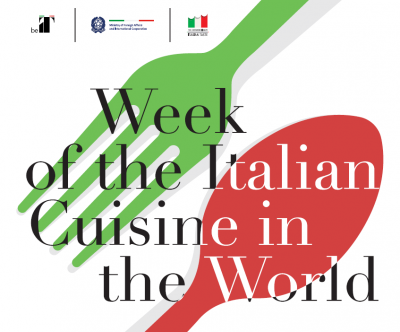Promoted by the Ministry of Foreign Affairs and International Cooperation through its network of Embassies, Consulates, Italian Cultural Institutes and ICE (ITA: Italian Trade Agency) offices abroad, an initiative dedicated to the promotion of high-quality Italian cuisine and agrifood products was launched in 2016 and now has an established place on the annual activity calendar of the Italian Academy of Cuisine’s international Delegations and Legations.
The 2025 edition of Week of the Italian Cuisine in the World will be more flexible and diffuse. An important innovation: the event will not have fixed dates as in previous editions. From this year, Embassies, Consulates and Italian Cultural Institutes worldwide, alongside other partners, will organise events in different periods according to local needs and conditions.
This new approach, promoted by Italy’s Ministry of Foreign Affairs and International Cooperation, aims to facilitate increased capillary reach, participation and visibility for Italian cuisine around the world.
The theme chosen for this edition is: ‘Italian cuisine between health, culture, and innovation'.
The first edition of Week of the Italian Cuisine in the World, held from 21 to 27 November 2016, had among its goals that of further developing the themes informing the Milan Expo in 2015: quality, sustainability, culture, food safety, the right to nourishment, education, identity, territory and biodiversity.
 The project, conceived and coordinated by the Foreign Ministry’s Directorate General for Country Promotion, operates within a working group involving not only central government bodies but also local ones, public and private organisations, production chains and the academic and scientific world.
The project, conceived and coordinated by the Foreign Ministry’s Directorate General for Country Promotion, operates within a working group involving not only central government bodies but also local ones, public and private organisations, production chains and the academic and scientific world.
Since the first Food Week, the Italian Academy of Cuisine has been a partner in this initiative promoted by the Foreign Ministry (MAECI), and in recent years has been recognised for its front-line role in furthering the project’s aims: protecting and raising awareness about Italian culinary traditions abroad and promoting the highest levels of excellence in cuisine, which is one of the essential components of Italian identity and culture and a distinctive aspect of the ‘Italian brand’.
It is customary for the Week to be introduced by a presentation to the press.
In its first two years, the Week delved into issues emerging from the Milan Charter, without concentrating on a unified theme: ‘Italian-sounding’ products, exports, agrifood protection and regional resources, the Mediterranean Diet, and the international promotion of culinary and wine-making traditions and PGI and PDO certifications.
In 2018 there was a strong focus on fostering and promoting the Mediterranean Diet and its ingredients, regional touristic and wine-and-food itineraries, and the 150th anniversary of the composer, noted gourmet and culinary enthusiast Gioachino Rossini’s death in association with the celebrations held by the Centenari Rossiniani organisation.
Themes of successive editions
From the following year, each edition identified a central theme unifying all its activities.
2019 – 4th Week: “Food education: the culture of taste”;
2020 – 5th Week: “Lore and flavours from the lands of
2021 – 6th Week: “Tradition and prospects of Italian cuisine: understanding and optimising food sustainability”;
2022 – 7th Week: “Conviviality, sustainability and innovation: Italian ingredients for healthy people on a healthy planet”;
2023 – 8th Week: “At the table with Italian cusine: well-being with taste”.
2024 - 9th Week: 'Mediterranean Diet and Culinary Roots: Health and Tradition'.
The participant institutions, which have spent years promoting excellent Italian cuisine, organised thousands of events: seminars on food sustainability and certifications, meetings with chefs, cookbook presentations, tastings, dinners, cooking courses, conferences on sports nutrition, promotion of tourist itineraries, and communication activities. The central component was, of course, culture: many events included screenings of documentaries or other food-related films, culinary history conferences, concerts, language courses or photo exhibitions relating to the theme.
And thanks to its international presence (over 90 Delegations and Legations in 40 countries) and its Academicians’ passion and competence, the Academy was a major participant, proposing brilliant initiatives and convivial events dedicated to the annual theme. Academicians from Italian Delegations also deserve gratitude, as they often made cultural contributions by participating in conferences as expert speakers.
In recent years, the Academy’s ties with
Ministerial circulars to Italian Embassies, Consulates, Cultural Institutes and trade offices have reiterated the Academy’s important seventy-year milestone, inviting various institutions to collaborate fruitfully with the Academy’s local branches.
